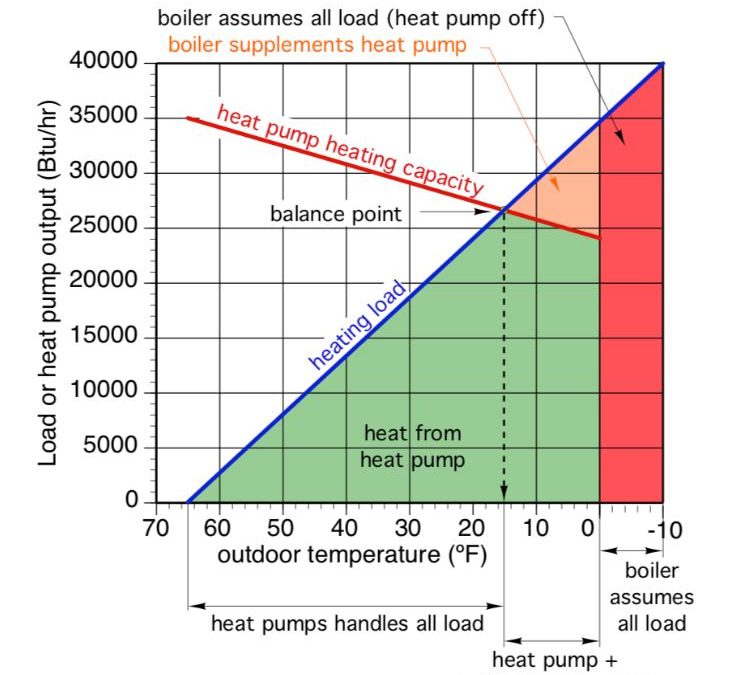UPDATE: I stupidly didn’t notice, until a commenter pointed it out, that this article talks only about air-to-water heat pumps, which do the harder job of heating up water to be used in home heating, rather than the more common air-to-air system. These conclusions should NOT be used for air-to-air heat pumps.
When I moved to New Hampshire in the late 1980s our apartment had an air-sourced heat pump and it really sucked – didn’t do a good job for many weeks in the winter. But the technology of removing heat from the air through compression and expansion of liquids has improved by leaps and bounds since then and heat pump fans say they are now a viable alternative here.
Sustainableheating.org has a small article looking at the issue (read it here) and says that air-to-water systems can carry the load when the air temperature is above 15 degrees F. Below that, things get iffy; below 0 F, they’re useless.
The above chart is from a firm called Appropriate Solutions.


 Return to the Concord Monitor
Return to the Concord Monitor
My only source of heat is two Fujitsu heat pumps. I live in Maine. When it gets well below zero, they still put out plenty of heat. All over northern New England, tight, well insulated houses are being comfortably heated with air source heat pumps. The idea that they don’t work at below zero temperature is just wrong.
The article from sustainable heating talks about air to water heat pumps. They’re pretty rare. Air to air heat pumps, which are becoming common in Northern New England, work fine at temperatures way below zero F. Mine are our only source of heat here in Maine.
As a homeowner on a budget, I’m not just interested in whether a heat pump “works” (keeps up with heat loss) as with whether it is cost-effective to run (Is the true net COP, including defrost cycles, greater than 1.0?)
Looking at overnight lows this week, I’d have needed to keep a fossil fuel burner to affordably avoid freezing.
I own a home with three air to air heat pumps (Mitsubishi units new in winter 2016/17). I would agree that in general, they do not do the job at below 10 degrees F temp. Our two units that heat relatively small spaces for short periods and work even when the temperature is low. However the unit that heats most of the first floor area really struggles in the low temps, it runs constantly and can’t keep the indoor temp over 55. I would suggest that the placement of the units and the configuration of the space, are critical factors in whether the units can produce adequate heat at low temperatures.
I have solar panels for electricity, and a backup LPG furnace, so I’m really motivated to use the electric heaters, but there are some days every winter when I am forced to turn on the backup furnace just to stay warm. Putting in another heat pump might help, but it’s just not worth it for the relatively few days it gets this cold. Open plan houses are great for wood stoves, but not so much for heat pumps IMHO.
The State of NH is offering $750 rebates on heat-pump water heaters (example: Rheem 80-gallon). That model does have a resistive heating element to fall back on for very cold days.
In the 4 years since this was published I had been hoping the state of NH would start offering use case studies about oil->water HP conversion, or monthly operating costs.
Has anyone in central NH switched to these water heaters, and heat their homes with them?
I’ve seen seeral discussoins about it on reddit groups for NH and for energy. Sees to work pretty well.
HVAC system: the unsung hero of modern living, harmonizing climate control for ultimate comfort in every season
Explained the intricacies of HVAC systems beautifully, making it easy for readers to understand the importance of proper heating, ventilation, and air conditioning for optimal indoor comfort and air quality. Kudos to the writer for breaking down complex concepts into digestible information
The unsung heroes of comfort and climate control, silently working to keep us cool in summer, warm in winter, and breathing easy year-round
Thank you for sharing all this valuable information!